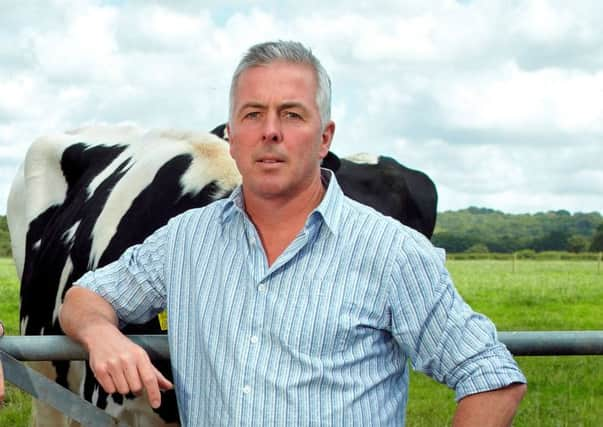Free range milk looks to make its name


Farmers and milkmen gathered at Huddersfield Town Hall to meet Neil Darwent, dairy farmer and founder of the Free Range Dairy Network, and joint director Carol Lever. The Free Range Dairy Network is a community interest company (CIC) which was established in July 2014.
“It’s a response to ‘get big or get out’ messages coming from within the dairy industry,” Mr Darwent said.
Advertisement
Hide AdAdvertisement
Hide Ad“The aim is to offer farmers an alternative vision of the future founded on value rather than volume. We’re promoting a fair price for farmers and healthy, affordable milk for consumers.”
The network is currently launching its Free Range Dairy Pasture Promise Label, which can only be used on milk from cows that graze for six months of the year.
“We’re working with an independent auditing company to guarantee that this label ensures that cows have had the freedom to graze for six months, days and nights, and that the farmer is being paid a fair price,” Mr Darwent said.
“We’re not seeking to establish a niche market for free range milk, but to achieve recognition for thousands of dairy farmers who allow their herds the freedom to graze.”
Advertisement
Hide AdAdvertisement
Hide AdRobert Nobles, group secretary for the National Farmers’ Union (NFU) told the meeting: “The majority of dairy farmers in the area are already doing this, producing free range milk, but in this area six months could be quite a challenge. Some of the farmers round here don’t let out until well into May.”
He added that ensuring cows grazed for 180 days could in some cases raise animal welfare concerns.
Mr Darwent said: “I do acknowledge that grazing for six months of the year could be an issue for some milk producers farming above a certain altitude. However, I’m constantly surprised by those who defy conventional local wisdom wherever I go.
“We feel it’s important to establish a six-month grazing period for free range herds in order to give consumers a clear message about cows spending at least half of their lives out in fields.
Advertisement
Hide AdAdvertisement
Hide Ad“Of course, there will be some farmers committed to grazing their cows for as long as possible who, for one reason or another, are unable to achieve 180 days at grass year in year out.
“We will allow Free Range Dairy members to apply for a derogation to house cows during times of extreme weather, since we wouldn’t want to compromise the welfare of cows by forcing them to stay outside when conditions are detrimental to their health and wellbeing.
“It might be that following consultation with local dairy farmers, we’re able to make some allowance for altitude. But this would have to be based on clear evidence that 180 days was not attainable due to lack of grass growth and local climate.
“I would be very happy to discuss the obstacles to achieving free range status with hill farmers interested in joining us in the Yorkshire Pennines area.”
Advertisement
Hide AdAdvertisement
Hide AdThe meeting was convened by the Kirklees Green Party, which has five councillors in Kirklees including farmer Robert Barraclough and former mayor Julie Stewart-Turner, who were at the meeting along with parliamentary candidate for the Colne Valley Chas Ball.
Mr Ball said the Kirklees Green Party would support a local campaign promoting Free Range Dairy.
“We feel we could develop a consumer campaign in Kirklees helping to inform people of what they can do,” he said.
“If we sit back and do nothing we run the risk of losing local milk production.
Advertisement
Hide AdAdvertisement
Hide Ad“Too much of what survives of the dairy industry will become bigger and bigger units where cows are permanently indoors.
“With milk quotas disappearing we may become even more dependent on imported milk and lose free range and organic dairy farmers. Consumers can help by supporting Free Range Dairy, buying farm-bottled milk delivered by roundsman or from farm shops or supporting supermarkets that pay farmers’ production costs.”
Carol Lever of Free Range Dairy added: “We’re really appreciative of the chance to meet with people who are finding opportunities to deliver and promote local sustainable food systems.
“We want to work with farmers who can meet the Free Range Dairy standards to develop those opportunities and help grow that market in Kirklees and other areas.”
Advertisement
Hide AdAdvertisement
Hide AdThe self-appointed mission adopted by the dairy industry to add value to the milk they produce took on even greater importance this week when the EU milk quotas were abolished.
Milk quotas were originally introduced in 1984 to address the oversupply of milk on the EU market during the late 1970s and early 1980s that led to the infamous milk lakes and butter mountains as dairy products went to waste.
But with Britain having fallen short of its production allowance for a number of years there are fears that over EU countries, where the capacity to produce milk in higher volumes than in Britain, will see British farmers miss out on any potential gains that the abolition of quotas brings.
Outlining the challenge facing British farmers, Laurie Norris, dairy lead for the NFU in the region, said: “This year UK dairy farmers have not hit their quota allocation - producing 1billion litres less than the limit. This is in contrast to some other EU countries.
Advertisement
Hide AdAdvertisement
Hide Ad“As a result, for Yorkshire farmers, it is not so much of an opportunity as a threat, with the potential for more milk to be produced in the EU. This could increase volatility and impact on prices further, and lay us open to more imports of processed products.”
Dr Judith Bryans, Dairy UK’s chief executive, was upbeat about the end of quotas, saying: “It is another step towards the ongoing development of a market-led, globally competitive European dairy sector that will be able to fully exploit a growing demand for dairy products worldwide.”